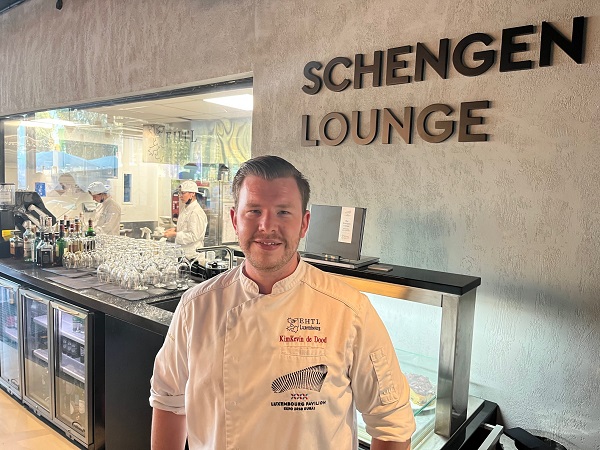 Kim Kevin de Dood, Head Chef, Schengen Lounge;
Credit: Geoff Thompson
Kim Kevin de Dood, Head Chef, Schengen Lounge;
Credit: Geoff Thompson
The World Expo 2020 in Dubai is taking place over a six-month period, from October 2021 to the end of March 2022; Chronicle.lu visited the Dubai Expo, and met up with Kim Kevin de Dood, Head Chef at the Schengen Lounge restaurant there.
Chronicle.lu: As Executive Chef at the Luxembourg Pavilion at Expo 2020 Dubai, please introduce yourself and your background.
Kim Kevin de Dood: I’m 30 years old: I studied in culinary school and then started working in various Michelin starred restaurants in the United Kingdom (UK), Belgium, Germany and Malaysia, as well as in Singapore where I was Head Chef. I have always tried to learn from the different experts and ways of cooking. I’m very interested in Asian cuisine, that’s why I went to Singapore aged 23 and when I became Head Chef at age 24 and gained my first Michelin Star. After five to six years, I opened a restaurant in Malaysia for the same owners. Then I was contacted by the École d'Hôtellerie et de Tourisme du Luxembourg (EHTL) by one of my former teachers where I have been teaching for two years and this then led to the opportunity here in Dubai. I taught for two years in Diekirch and am technically teaching here too.
Chronicle.lu: How long is your appointment for in Dubai? When did it start and when will it come to an end?
Kim Kevin de Dood: I have been in Dubai since 1 August 2021 and I will stay in Dubai until 10 April. Then I will take a break for about two months; as beautiful as the Expo is, it is exhausting. I will then return to Singapore to the St Pierre as Executive Chef.
Chronicle.lu: For your position at the Luxembourg Pavilion at Expo 2020 Dubai, from where have you got your inspiration to create “traditional Luxembourg dishes with a twist”?
Kim Kevin de Dood: There are a lot of childhood memories, e.g. Kniddelen, Gromperekichelcher, Reisling Paté, etc. – why change what is good already? For other dishes, I would not have been able to recreate them as we cannot use pork in Dubai, for example. Instead of focussing on certain dishes, I focussed on key ingredients such as river trout, fennel, caramelised onions and beef - in the Middle East and Asia, they like their meat well done. These also showcase what Luxembourg is all about (a lot of foreigners live in Luxembourg). It makes what you expect, totally different. As many visitors to the Luxembourg Pavilion are Luxembourgish, I hoped to change the classics to show what can be done. A typical example of this is Kniddelen (dumplings), which has been prepared in a way that has not been done before. Here, I could not use pork, but I wanted to keep the same characteristics. I wanted to make it prestigious, so I used smoked duck instead.
Chronicle.lu: How many people does the Luxembourg Pavilion restaurant cater for on a daily/weekly basis? i.e. how many meals do you and your team prepare?
Kim Kevin de Dood: On a daily basis we are seeing a good average of 160 meals per day; the initial target was bigger than this but with COVID-19, etc., we are delighted with what we are doing.
Chronicle.lu: How many other people are in your team? Do they come from Luxembourg, or locally in Dubai?
Kim Kevin de Dood: In total the team is 28 staff, of which thirteen are EHTL students from Luxembourg, plus four kitchen staff, two stewards and nine to ten service staff (from the Jumeirah group, from various nationalities - very multicultural, like in Luxembourg.
Chronicle.lu: How often do you do Show-Cooking Experiences at the Luxembourg Pavilion, and do you do the same, or variations on the same, experience each time?
Kim Kevin de Dood: We do this irregularly, at special events and for specific clients; they are always different, we always do different things.
Chronicle.lu: Can you please tell us about the ingredients you use here at the Schengen Lounge?
Kim Kevin de Dood: Unfortunately, we cannot use many raw ingredients from Luxembourg due to harsh restrictions on imports, particularly cheese; it is important that the ingredients are of good quality. Most of the ingredients are ordered through the Jumeriah group and they get the supplies from their providers. Some products have been challenging, like the smoked trout where I had to be very specific in what I wanted.
Kim Kevin de Dood concluded by stating that around 95% of all food products used in the United Arab Emirates (UAE) are imported, but he confirmed that this is changing.








